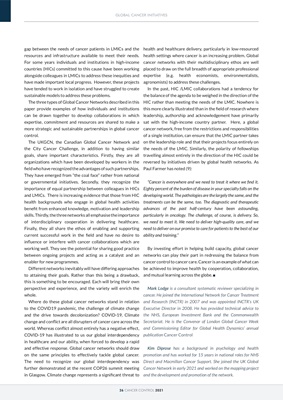
GLOBAL CANCER INITIATIVES
26 CANCER CONTROL 2021
health and healthcare delivery, particularly in low-resourced
health settings where cancer is an increasing problem. Global
cancer networks with their multidisciplinary ethos are well
placed to draw on the full breadth of appropriate professional
expertise (e.g. health economists, environmentalists,
agronomists) to address these challenges.
In the past, HIC /LMIC collaborations had a tendency for
the balance of the agenda to be weighed in the direction of the
HIC rather than meeting the needs of the LMIC. Nowhere is
this more clearly illustrated than in the field of research where
leadership, authorship and acknowledgement have primarily
sat with the high-income country partner. Here, a global
cancer network, free from the restrictions and responsibilities
of a single institution, can ensure that the LMIC partner takes
on the leadership role and that their projects focus entirely on
the needs of the LMIC. Similarly, the polarity of fellowships
travelling almost entirely in the direction of the HIC could be
reversed by initiatives driven by global health networks. As
Paul Farmer has noted (9):
"Cancer is everywhere and we need to treat it where we find it.
Eighty percent of the burden of disease in your specialty falls on the
developing world. The pathologies are the largely the same, and the
treatments can be the same, too. The diagnostic and therapeutic
advances of the past half-century have been astounding,
particularly in oncology. The challenge, of course, is delivery. So,
we need to meet it. We need to deliver high-quality care, and we
need to deliver on our promise to care for patients to the best of our
ability and training."
By investing effort in helping build capacity, global cancer
networks can play their part in redressing the balance from
cancer control to cancer care. Cancer is an example of what can
be achieved to improve health by cooperation, collaboration,
and mutual learning across the globe. n
Mark Lodge is a consultant systematic reviewer specializing in
cancer. He joined the International Network for Cancer Treatment
and Research (INCTR) in 2007 and was appointed INCTR's UK
Executive Director in 2008. He has provided technical advice to
the NHS, European Investment Bank and the Commonwealth
Secretariat. He is the Convenor of London Global Cancer Week
and Commissioning Editor for Global Health Dynamics' annual
publication Cancer Control
Kim Diprose has a background in psychology and health
promotion and has worked for 15 years in national roles for NHS
Direct and Macmillan Cancer Support. She joined the UK Global
Cancer Network in early 2021 and worked on the mapping project
and the development and promotion of the network.
gap between the needs of cancer patients in LMICs and the
resources and infrastructure available to meet their needs.
For some years individuals and institutions in high-income
countries (HICs) committed to this cause have been working
alongside colleagues in LMICs to address these inequities and
have made important local progress. However, these projects
have tended to work in isolation and have struggled to create
sustainable models to address these problems.
The three types of Global Cancer Networks described in this
paper provide examples of how individuals and institutions
can be drawn together to develop collaborations in which
expertise, commitment and resources are shared to make a
more strategic and sustainable partnerships in global cancer
control.
The UKGCN, the Canadian Global Cancer Network and
the City Cancer Challenge, in addition to having similar
goals, share important characteristics. Firstly, they are all
organizations which have been developed by workers in the
field who have recognized the advantages of such partnerships.
They have emerged from "the coal face" rather from national
or governmental initiatives. Secondly, they recognize the
importance of equal partnership between colleagues in HICs
and LMICs. There is increasing evidence that those from HIC
health backgrounds who engage in global health activities
benefit from enhanced knowledge, motivation and leadership
skills. Thirdly, the three networks all emphasise the importance
of interdisciplinary cooperation in delivering healthcare.
Finally, they all share the ethos of enabling and supporting
current successful work in the field and have no desire to
influence or interfere with cancer collaborations which are
working well. They see the potential for sharing good practice
between ongoing projects and acting as a catalyst and an
enabler for new programmes.
Different networks inevitably will have differing approaches
to attaining their goals. Rather than this being a drawback,
this is something to be encouraged. Each will bring their own
perspective and experience, and the variety will enrich the
whole.
Where do these global cancer networks stand in relation
to the COVID19 pandemic, the challenge of climate change
and the drive towards decolonization? COVID-19, Climate
change and conflict are all disrupters of cancer care across the
world. Whereas conflict almost entirely has a negative effect,
COVID-19 has illustrated to us our global interdependency
in healthcare and our ability, when forced to develop a rapid
and effective response. Global cancer networks should draw
on the same principles to effectively tackle global cancer.
The need to recognize our global interdependency was
further demonstrated at the recent COP26 summit meeting
in Glasgow. Climate change represents a significant threat to